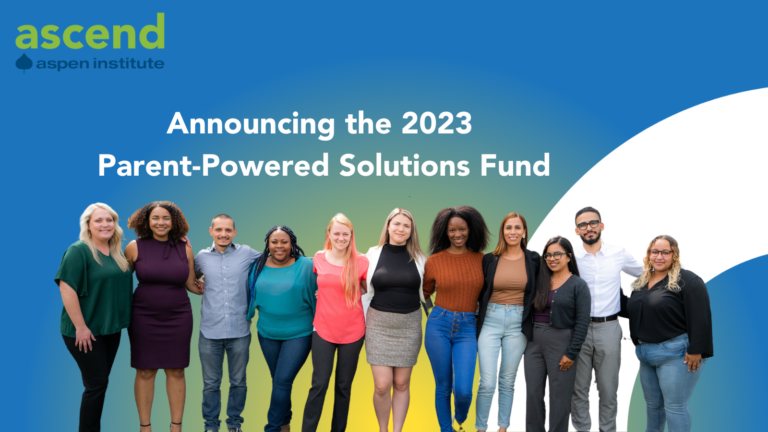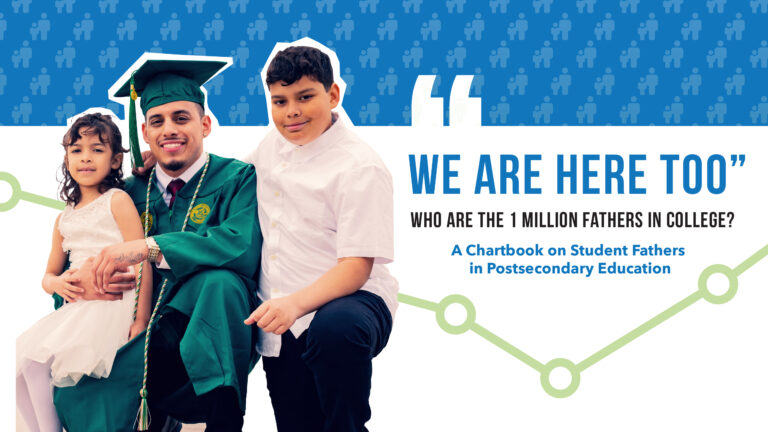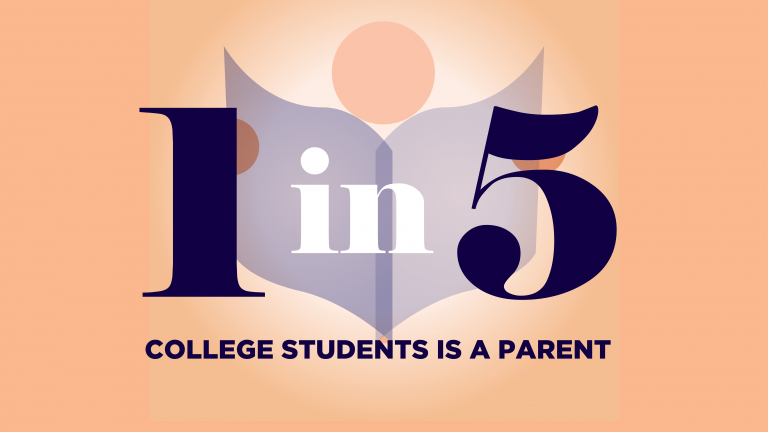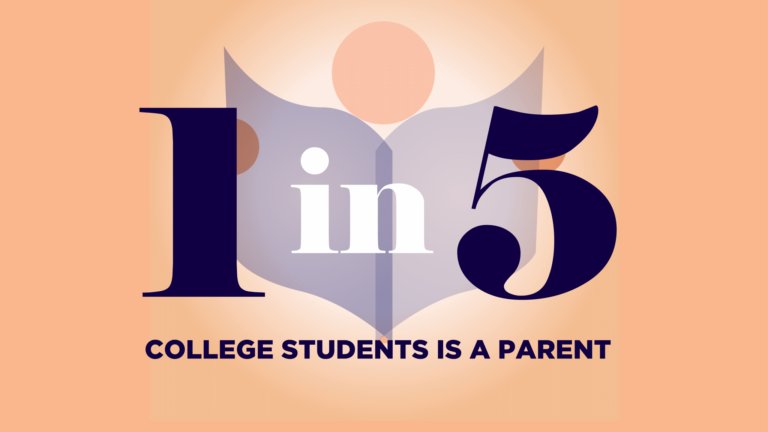Aspen Institute Announces Policy Acceleration Partnership Grant Awardees
Contact: James White
Ascend at the Aspen Institute
James.White@aspeninstitute.org
Aspen Institute Announces Policy Acceleration Partnerships
Six public entities partnering with community organizations to
advance professional success for students who are parents
Washington, DC – Ascend at the Aspen Institute today announced recipients of the Aspen Policy Acceleration Partnerships – a new effort to support cities, counties, and states committed to increasing economic mobility and well-being for students who are parents. Six public entities were selected as strategic partners and field innovators – they will work together with Ascend to achieve a shared goal of promoting postsecondary completion for parents by increasing access to supports and public benefits. These partnerships will ensure that policies and systems lead parents to credentials and careers that provide living wages, access to opportunities for advancement, and continued learning in sectors with high growth and demand. The awards are 18-month grants of $150,000 to fuel city, county, and state agencies’ work in partnership with other public entities, parents, and community-based organizations.
Aspen Postsecondary Success for Parents (PSP) Initiative National Advisors, a cohort of leaders from higher education institutions and nonprofit organizations, designed the request for proposal for this effort and selected awardees. National Advisors share and inform strategies and recommendations to support student parents. Ascend PSP Parent Advisors, a group of student parents whose first-hand experiences drive the PSP Initiative, provided feedback throughout the selection process.
“It takes strong partnerships and innovation to advance postsecondary success for parents, which is why we turned to their communities for creative solutions. These exciting new partnerships are geographically diverse and designed to accelerate important work on behalf of parents and will serve as strong models for other cities and states. I’m thrilled to watch these innovations open doors for more student parents,” said Anne Mosle, vice president at the Aspen Institute and executive director of Ascend.
“Creating real solutions for student parents is within the reach of governors and state leaders through the incentivizing and scaling of cross-sector solutions,” said Amanda Winters, postsecondary program director at the National Governors Association Center for Best Practices and PSP National Advisor. “The projects represented in the Policy Acceleration Partnership recipients represent exactly the types of innovative and collaborative efforts that can make a true impact.”
Aspen Policy Acceleration Partnership awardees are:
- Bright from the Start: Georgia Department of Early Care and Learning (DECAL) and Technical College System of Georgia (TCSG) (GA)
-
- Key Partners: Atlanta Public Schools, Atlanta Technical College, Kennesaw State University, and Nana Grants.
This grant is supported in partnership with Ascend and the Liz Blake Giving Fund of the Blake Family Foundation.
DECAL will establish two-generation (2Gen) Community Leadership Teams at three TCSG campuses that will focus on understanding the issues, challenges, and opportunities that impact educational attainment for single mothers and student parents. The teams will include representatives from child care, secondary and postsecondary education, the Supplemental Nutrition Assistance Program (SNAP), Temporary Assistance for Needy Families (TANF), the Special Supplemental Nutrition Program for Women, Infants, and Children (WIC), as well as parents enrolled in postsecondary or adult education. The lessons learned at the community-level will inform state-level policy and practice changes.
- City of Long Beach (CA)
-
- Key Partners: City of Long Beach Department of Health and Human Services, Long Beach City College, Long Beach Unified School District, Long Beach Youth Services Network, Los Angeles County Board of Supervisors, Department of Children and Family Services, Department of Public and Social Services, Long Beach Memorial Medical Center, Port of Long Beach, Swinerton, Relativity Space, Echo Global Logistics, and the Chamber of Commerce.
The City of Long Beach will establish a fund and/or individual escrow accounts that provide guaranteed income to single mothers that are in school or training, expand subsidized in-home child care options, and address social service, workforce, and education policy and program barriers that impede their academic and workplace success.
- Colorado Community College System (CCCS)(CO)
-
- Key Partners: Community College of Aurora, the Colorado Department of Higher Education, the Bell Policy Center, and the Colorado Department of Human Services.
The CCCS will establish a statewide Student Parent Advisory Work Group, informed by best practices in effective student parent supports, to address policies and practices in CO. Efforts will be scaled and disseminated throughout the CCCS colleges and other CO higher education institutions. Policy findings and recommendations will be disseminated to relevant departments of government and legislative bodies.
-
- Key Partners: Raise the Barr, Minnesota State Colleges and Universities, MN Department of Human Services, and the MN Department of Health.
The MN Office of Higher Education will fund a full-time Whole Family & Student Parent Coordinator. The coordinator will oversee planning, research, and development for student parent initiatives on college campuses in MN, engage in purposeful collaboration and coalition building with nonprofit organizations, state agencies, and other stakeholders, including student parents, to work toward a shared vision of success for student parents. The MN Office of Higher Education will also use the grant to host three convenings to formally launch the MN Student Parent Alliance, which will raise awareness about and increase resources to student parents and their children in MN.
-
- Key Partners: Pennsylvania Governor’s Office of Advocacy and Reform, Pennsylvania Department of Education (PDE), Pennsylvania Housing Finance Agency, Pennsylvania Department of Health’s Office of Health Equity, and the Hope Center for College, Community, and Justice at Temple University.
The PA DHS will advance the PA Parent Pathways Initiative (Parent Pathways) to increase economic independence through postsecondary education, leading to family sustaining careers and improved quality of life for both parents and children. Within Parent Pathways, DHS will establish an advisory committee that will advise them and the PDE on policy issues related to TANF, SNAP, Medicaid, subsidized child care, financial aid, housing assistance, and workforce development. Additionally, the Department will develop a Parent Pathways Learning Network for Technical Assistance and create a sustainability plan with philanthropic partners.
-
- Key Partners: West Elmwood Housing Development Corporation, Dunamis Synergy Initiative, Comprehensive Community Action Program, and ResCare.
The RI DHS will advance its Whole Family Approach Initiative, specifically its young parent policy. The Department has incorporated a young parent policy into its Blueprint Initiative for Change and its strategic plan to focus on easing regulations, policy, and legislative hurdles that prevent young parents from obtaining long-term self-sufficiency. DHS collaborates with the Dunamis Synergy Initiative, a 2Gen effort to improve economic, educational, and social outcomes for young parents. It will strengthen this partnership to utilize student parent leaders to inform and advance a statewide 2Gen young parent policy agenda and improve existing cross-sector collaboration to create a clear pathway to policy reform.
“We are thrilled to be a recipient of this generous grant to help us more effectively serve the significant number of our students who are also parents,” said Joe Garcia, chancellor of the Colorado Community College System. “They are not only one of our fastest growing student populations, but also some of our hardest working, most ambitious students with big dreams but often even bigger challenges. By developing the right policies, we will help them achieve educational success, self-sufficiency, and economic mobility.”
The PSP Initiative is a partnership between Ascend, Imaginable Futures, and ECMC Foundation that raises awareness about and shares strategies to better support student parents. Resources from both funders supported the Policy Acceleration Partnerships.
Jennifer Zeisler, senior program director for Career Readiness at ECMC Foundation: “ECMC Foundation’s focus is on single mother students, which make up more than 10 percent of all undergraduate students; of these single mothers 90 percent have incomes at or near the poverty line and a disproportionate amount are women of color. Although similar in many ways to other nontraditional students, single mother students bring a unique set of strengths, yet experience additional barriers to program completion. Grants to these influential regions will accelerate the action-oriented and outcomes-driven strategies needed to drive cross-sector alignment, inform policy and practice change, and ultimately improve postsecondary success for single mother students.”
Vinice Davis, venture partner at Imaginable Futures: “More than 1 in 5 students enrolled in postsecondary education are raising children, yet so little infrastructure across institutions and policies exists to support them. Despite their best efforts, they often fall through the cracks, due to the unique challenges and barriers they face along their journey and the demands of balancing school, work, and childcare, among other things. We’re proud to support the Aspen Policy Acceleration Partnership program because it brings in the much-needed public sector to the table, to forge partnerships with community organizations and peer agencies to drive solutions that support student parents. I’m thrilled to see a diverse set of awardees across various geographies committed to the success of student parents and their children.”
————-
Ascend at the Aspen Institute is the national hub for breakthrough ideas and collaborations that move children and their parents toward educational success, economic security, and health and well-being. We embrace a commitment to racial equity and a gender lens. For more information, visit https://ascend.gray64.dev
The Aspen Institute is an educational and policy studies organization based in Washington, DC. Its mission is to foster leadership based on enduring values and to provide a nonpartisan venue for dealing with critical issues. The Institute is based in Washington, DC; Aspen, Colorado; and on the Wye River on Maryland’s Eastern Shore. It also has offices in New York City and an international network of partners. For more information, visit www.aspeninstitute.org
ECMC Foundation is a Los Angeles-based, nationally focused foundation whose mission is to inspire and to facilitate improvements that affect educational outcomes—especially among underserved populations—through evidence-based innovation. It is one of several affiliates under the ECMC Group (www.ecmcgroup.org) enterprise based in Minneapolis. ECMC Foundation makes investments in two focus areas: College Success and Career Readiness; and uses a spectrum of funding structures, including strategic grantmaking and program-related investments, to invest in both nonprofit and for-profit ventures. Working with grantees, partners and peers, ECMC Foundation’s vision is for all learners to unlock their fullest potential. For more information, visit www.ecmcfoundation.org.
Imaginable Futures (IF) is a global philanthropic investment firm that believes learning has the power to unlock human potential and aspires to provide every learner with the opportunity and the tools they need to imagine, and to realize, a brighter future. By taking a systems approach to solving complex education challenges, IF works across public, private and social sectors to bring to life transformational ideas in local, national and global contexts for learners of all ages. With a deep commitment to on-the-ground partnership and co-creation with those we serve, Imaginable Futures is empowering learners, families and communities to be the changemakers of the future. Established in 2020 and managed by a global team, Imaginable Futures has invested $200 million in more than 100 partners across Africa, Latin America and the United States, as well as in India with sister organization, Omidyar Network India. Imaginable Futures is a venture of The Omidyar Group and is founded and funded by Pierre and Pam Omidyar. Follow us at @imaginablefut and learn more at www.imaginablefutures.com.
# # #
Related Posts















